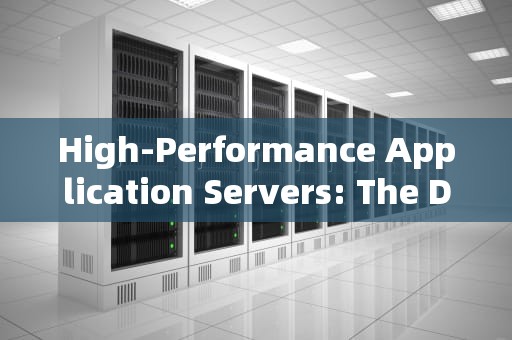In the digital era, where data is omnipresent and applications are at the core of every operation, high-performance application servers have emerged as the cornerstone of modern computing. These powerful platforms are designed to handle massive workloads, ensure rapid response times, and maintain unwavering reliability, making them indispensable for businesses seeking to thrive in a competitive landscape.

High-performance application servers are specialized computer programs that reside on servers, providing a platform for running application software. They act as intermediaries between users and backend databases, efficiently managing requests and delivering responses with minimal latency. Unlike traditional servers, which may struggle under heavy loads or complex tasks, these advanced servers are engineered to excel in demanding environments, offering a host of benefits that propel digital innovation forward.
One of the primary advantages of high-performance application servers is their ability to scale effortlessly. As businesses grow and user demands fluctuate, these servers can dynamically allocate resources to meet the changing needs. This scalability ensures that applications remain responsive even during peak usage periods, preventing slowdowns or crashes that could otherwise lead to revenue loss and customer dissatisfaction. For instance, e-commerce giants like Amazon rely on high-performance application servers to handle millions of transactions during holiday sales rushes, ensuring a seamless shopping experience for customers worldwide.
Moreover, these servers boast robust security features that safeguard sensitive data from cyber threats. In an age where data breaches are increasingly common and costly, high-performance application servers employ encryption, authentication, and access control mechanisms to protect information. Financial institutions, such as banks and stock exchanges, depend on these servers to secure customer funds and confidential financial data, maintaining trust and compliance with stringent regulations.
Another key aspect is their high availability. Downtime can be devastating for businesses, resulting in lost productivity and revenue. High-performance application servers are equipped with failover and redundancy systems, ensuring continuous operation even in the event of hardware failures or network disruptions. Cloud service providers, for example, utilize these servers to offer reliable services to clients, guaranteeing uptime through multiple data centers and backup systems.
The performance optimization capabilities of these servers are also worth noting. They are finely tuned to maximize resource utilization, reducing wastage and lowering operational costs. By efficiently managing CPU, memory, and storage, high-performance application servers enable organizations to get the most out of their hardware investments. This efficiency is particularly crucial for startups and small businesses with limited budgets, allowing them to compete effectively without overspending on infrastructure.
In addition, high-performance application servers facilitate seamless integration with various technologies. Whether it's connecting with databases, third-party APIs, or other microservices, these servers provide the necessary framework for smooth communication and data exchange. This interoperability enables the development of complex, feature-rich applications that can adapt to evolving business requirements. For example, a healthcare application server can integrate patient records from different hospitals, lab results, and insurance systems, creating a comprehensive health profile for better diagnosis and treatment.
Furthermore, they support advanced functionalities such as load balancing, which distributes incoming network traffic across multiple servers to prevent any single server from becoming overwhelmed. This ensures optimal performance and reliability for mission-critical applications. Content delivery networks (CDNs), used by video streaming services like Netflix, leverage load balancing on high-performance application servers to deliver high-quality video content to users globally without buffering or interruptions.
The role of high-performance application servers extends beyond traditional business applications. In the realm of scientific research, these servers power supercomputing clusters that tackle complex problems like climate modeling, genomics, and aerospace engineering. Researchers at NASA, for instance, use high-performance application servers to simulate space missions and analyze vast amounts of data from telescopes and satellites, pushing the boundaries of human knowledge.
In the education sector, high-performance application servers enable online learning platforms to deliver interactive courses and virtual classrooms to students around the world. During the COVID-19 pandemic, when schools and universities shifted to remote learning, these servers played a vital role in ensuring uninterrupted education. They handled the surge in online course registrations, video streaming, and collaborative tools, making distance learning a viable option for millions of students.
Looking ahead, the future of high-performance application servers is promising. With the advent of technologies like artificial intelligence (AI) and the Internet of Things (IoT), the demand for more powerful and efficient servers will only continue to grow. AI algorithms require immense computational power for tasks such as image recognition, natural language processing, and predictive analytics. High-performance application servers will be at the forefront of this revolution, enabling the development and deployment of intelligent applications that can transform industries ranging from healthcare to manufacturing.
In conclusion, high-performance application servers are the driving force behind digital innovation. Their scalability, security, high availability, performance optimization, integration capabilities, and support for emerging technologies make them essential for businesses and organizations striving to succeed in the digital age. As technology continues to evolve at a rapid pace, these servers will undoubtedly play a pivotal role in shaping the future of computing and unlocking new possibilities across various domains. Embracing high-performance application servers is not just an option but a necessity for those who aim to stay ahead in today's highly competitive and technologically driven world.
随着互联网的普及和信息技术的飞速发展台湾vps云服务器邮件,电子邮件已经成为企业和个人日常沟通的重要工具。然而,传统的邮件服务在安全性、稳定性和可扩展性方面存在一定的局限性。为台湾vps云服务器邮件了满足用户对高效、安全、稳定的邮件服务的需求,台湾VPS云服务器邮件服务应运而生。本文将对台湾VPS云服务器邮件服务进行详细介绍,分析其优势和应用案例,并为用户提供如何选择合适的台湾VPS云服务器邮件服务的参考建议。

工作时间:8:00-18:00
电子邮件
1968656499@qq.com
扫码二维码
获取最新动态
